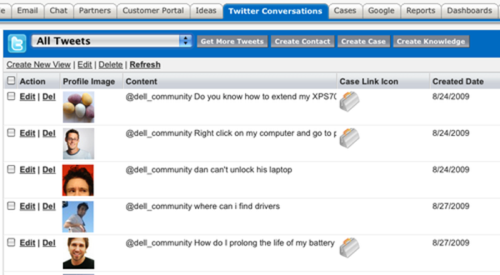Salesforce.com is best known for its CRM and its cloud computing platform. But according to the company its fastest growing product is Service Cloud, a kind of SaaS customer service software meant to replace the traditional call center.

Salesforce.com has launched the second version of Service Cloud, which incorporates new capabilities for handling content as well as a close connection with the social networks. Service Cloud 2 has three core components: a knowledge base for publishing longer content, Salesforce Answers for crowdsourcing support questions, and Salesforce for Twitter.
Knowledge as a Service?
Salesforce.com is touting the first addition to Service Cloud as “knowledge as a service.” Despite the overblown branding, Salesforce Knowledge is a simple platform for managing content you want to provide to customers needing assistance. It will appear as part of Service Cloud in Q4.
The content contained in the knowledge base can be distributed from within Service Cloud or added to your website. You can also send it directly to individual customers on a per-article basis, such as for info about specific products. Though they call them articles, the content can be structured in just about any way and can also include images and video.
Salesforce Answers
Salesforce Answers is an enterprise version of the Yahoo! Answers or any of the many other outlets for gathering crowdsourced responses to specific questions. Service Cloud’s approach is to open customer service-related questions up.
Questions can be published either to your own customer community or to your official fan page via a Facebook app. The responses are then collected and fed back into Service Cloud, along with the Facebook likes and other metadata. Salesforce Answers will not be available until early 2011.
Salesforce for Twitter
Salesforce.com first integrated Twitter into its CRM back in March, but now the free application on the AppExchange will now be available for including in Service Cloud. It allows you to do real-time tracking of Twitter conversations, as well as search and responding to tweets from within Service Cloud.
And what about the notorious Twitter downtime? Salesforce.com representatives said they’ve been working directly with the Twitter product team on the integration. That might not be a conclusive answer to reliability problems, that level of communication is more than most developers accessing the API ever get, and it should seriously affect how smoothly the integration works.
Use Cases
Many enterprises are skeptical of relying on Facebook and Twitter for customer service, but Service Cloud is fairly broad software suite, not just a way to tie in with social networks. Salesforce.com said Service Cloud customers are interested in one of three general use cases:
- Companies looking to replace expensive call centers. These business might not care so much about the social media capabilities, they just want a more cost-effective solution and aren’t afraid of the cloud.
- Enterprises interested in diving into social media, but which want a more comprehensive platform than single purpose apps like CoTweet. The user experience of traditional business applications might drive you batty, but many see a CRM-like approach to Twitter as a better fit with enterprise requirements, as opposed to something resembling personal apps for social networking.
- Those looking to better integrate online customer service with their website. These are the enterprises who will use the knowledge base most effectively.
Salesforce.com has been testing Service Cloud with big name customers like Dell, Comcast, and Starbucks thus far. In a briefing, the company claimed 8,000 customers were already using Service Cloud, and that it was growing much faster than any other product segment.


















